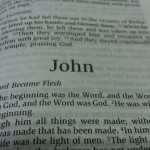The Holy Spirit in John

So far, I’ve looked at what the authors of Matthew, Mark, and Luke wrote about the Holy Spirit. In this post, I’m going to look at the information in the Gospel of John about the Holy Spirit.
As in the Synoptic Gospels, John tells us that John the Baptist saw the Holy Spirit descend on Jesus like a dove (John 1:32), and that John the Baptist contrasted his own water baptism with Jesus’ Spirit baptism (John 1:33).
Jesus tells Nicodemus that those born (born again or born from above) of the Holy Spirit are spirit (spiritual people? care about spiritual things?) (John 3:6). Also, he tells Nicodemus that the Spirit’s work is similar to the wind, in that you can’t see it, but you can tell that the Spirit is present and working (John 3:8). In the same context, John states that God gave the Spirit “without measure” to Jesus (the one whom God sent) (John 3:34).
John states that the Holy Spirit gives life (it is also implied that this same “life” is available to those who believe in Jesus) (John 6:63). He also compared receiving the Spirit to having “rivers of living water” flowing out of the innermost being. According to John, this Spirit (rivers of living water) would eventually be given to those who believe in him (future tense for the narrative time, but past tense for the author) (John 7:39).
There is much about the Spirit in John chapters 14-16. The Spirit is called “the Spirit of truth” and “the Helper” and is again promised to come and dwell with them (John 14:17). The Spirit (who is sent by the Father in Jesus’ name) will teach them all things and help them remember things (John 14:26). Similarly, John writes that Jesus will send the Spirit, who will testify about Jesus (John 15:26). Jesus says that it is better for him to go away (physically) so that the Holy Spirit (“Helper”) could come (John 16:7). John then says that the Spirit will convict the world of (or bring to light for the world) sin, righteousness, and judgment (John 16:8-11). We also learn that the Spirit does not speak of his own authority (much like Jesus said of himself), but will instead speak what he hears (“from God” is assumed) (John 16:13).
Then, at the end of John, we see Jesus breathing on his disciples and giving them the Holy Spirit (John 20:22).
In the Gospel of John, the Holy Spirit is presented in a more personal fashion than in the other Gospels. He is called “the Helper” as well as “the Spirit of truth.” Similarly, John says the the Spirit with “dwell with” his readers, much like the “Word” came to dwell with us (compare John 1:14 and John 14:17).
We see the Spirit sent by both the Father and Jesus to those who trust in (believe, have faith) in Jesus. These may not physically see the Spirit, but they will notice the works that he does. In fact, the righteous works and eternal life of the believer are said to originate from the Holy Spirit.
Most scholars agree that Matthew, Mark, and Luke were written many years before the Gospel of John was written. It seems that John may have included some additional information about the Holy Spirit that may help us understand what questions his readers were asking. This same information helps us understand the Holy Spirit a little more also.

I’ve been dealing with some Jehovah’s Witnesses lately who have been canvassing our neighborhood. Depending on my mood/patience/time, I occasionally engage them on discussions about the Holy Spirit, which they say is a powerful force of God, not a person. In John 16, where Jesus says he will send a Helper, is this the instance where he is speaking of the Spirit as “one just like me” or “one that exactly replaces me” kind of connotation? I need to be better educated related to how the Greek helps reveal the truth of who the Holy Spirit is related to the Trinity.
Brian,
In John 14:16, Jesus says, “And I will ask the Father, and he will give you another Helper, to be with you forever…” I don’t know if the Greek term translated “another” in this passage necessarily means “one just like me” or “one that exactly replace me.” There are probably other passages that better communicate the Holy Spirit’s relationship to the Trinity. I’m thinking of passages like Matthew 28:19, 1 Corinthians 12:4-6, and perhaps Matthew 12:31 (Mark 3:29, Luke 12:10). There are probably other passages… better passages… but those are the ones that jump to the top of my head.
-Alan
good post